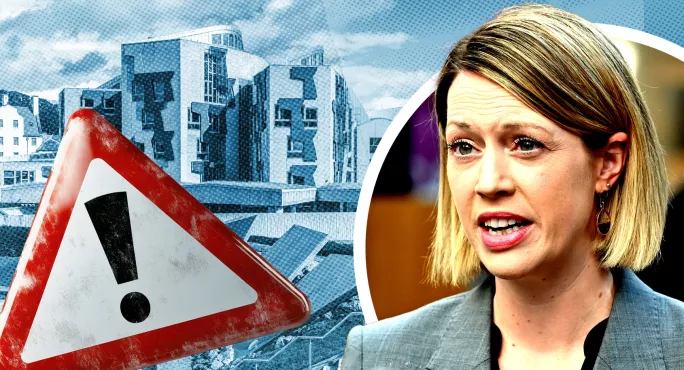
SQA awarding and accreditation functions ŌĆśmust be splitŌĆÖ

ScotlandŌĆÖs education secretary has been warned that failing to remove responsibility for accrediting and regulating qualifications from the body that replaces the Scottish Qualifications Authority could ŌĆ£undermine the entire reform programmeŌĆØ.
Today at a meeting of the Scottish ParliamentŌĆÖs Education, Children and Young People Committee, Jenny Gilruth committed to enabling cross-party discussion on the issue after coming under pressure from opposition MSPs, who insisted that the status quo is unacceptable.
However, Ms Gilruth also warned there is ŌĆ£no simple solutionŌĆØ and that looking for alternatives at this stage would ŌĆ£delay education reformŌĆØ at a time when she is ŌĆ£constantly, as cabinet secretary, being asked to move at paceŌĆØ.
Originally the Scottish government committed to replacing the Scottish Qualifications Authority (SQA) and reforming curriculum development and inspection body Education Scotland by last year.
Ms Gilruth, however, paused education reform after becoming cabinet secretary in 2023, arguing that it was ŌĆ£not the right time to introduce legislationŌĆØ when teachers and schools were still dealing with the fallout from the Covid pandemic.
Questions over Scottish education reforms
The expectation is that the new bodies will be up and running by autumn of this year - although Tes Scotland recently revealed that there are ŌĆ£challengesŌĆØ with that timeline.
Now the government faces gridlock after MSPs lodged more than 350 amendments to the education bill that will deliver the new qualifications body and independent inspectorate - a figure that has been described as ŌĆ£astonishingŌĆØ by Scottish Labour.
Where responsibility should sit for accrediting and regulating qualifications was described today by the Green Party MSP and education spokesperson Ross Greer as ŌĆ£the single most challenging issueŌĆØ.
- Background: Key proposal on SQA reform rejected by government
- Related: Scottish education reforms hit by ŌĆśchallengesŌĆÖ
- Analysis: Higher history controversy underpins case for independent exam watchdog
Currently the SQA awards qualifications as well as accrediting and regulating them.
But a ŌĆ£plethoraŌĆØ of amendments have been put forward over this dual role, according to the Liberal Democrat MSP and education spokesperson Willie Rennie. He argued that any one of them would be better than the status quo, which both the Organisation for Economic Cooperation and Development in 2021 and Professor Ken Muir in 2022 said should not continue.
Professor Muir said in his report that the SQA carrying out both functions amounted to the body ŌĆ£marking its own homeworkŌĆØ, and that splitting the functions would ŌĆ£restore the trust and confidence of the public, practitioners and learnersŌĆØ and ŌĆ£significantly strengthen the oversight of qualifications in ScotlandŌĆØ.
However, the government rejected the recommendation shortly after his report was published, saying there were ŌĆ£significant benefits to locating the functions in the new qualifications bodyŌĆØ.
Nevertheless, the issue has not gone away - with the Higher history debacle arguably providing more weight to the argument that the body that replaces the SQA should no longer ŌĆ£mark its own homeworkŌĆØ.
At todayŌĆÖs education committee meeting a number of options were put forward: Mr Rennie argued for the accreditation function to sit with ; Scottish Labour education spokesperson Pam Duncan-Glancy proposed moving it to a reformed Education Scotland as originally proposed by Professor Muir in his 2022 report; and Conservative MSP Stephen Kerr made the case for handing responsibility for accreditation and regulation of qualifications to the inspectorate.
However, Ms Gilruth said placing the accreditation function in Education Scotland - an executive agency of the Scottish government - would bring it ŌĆ£under much closer control of Scottish ministers, something which I do not think members would want to seeŌĆØ.
The SCQF Partnership, meanwhile, is not a public body but a registered charity, Ms Gilruth said, so this would have implications for accountability as well as for staff who would ŌĆ£no longer be public servantsŌĆØ.
Ms GilruthŌĆÖs proposal is to maintain the status quo in the short-term to enable a smooth transition to Qualifications Scotland but carry out a review of accreditation in two yearsŌĆÖ time. However, this was given short shrift by the committee.
That would put staff ŌĆ£into limbo for another two yearsŌĆØ, said Ms Duncan-Glancy - who also described the proposal as ŌĆ£a delaying tacticŌĆØ.
However, because the SNP is a minority government it has no choice but to reach out to other MSPs for support.
For his part, Mr Greer was clear that if the government could not achieve a consensus, the only option would be to choose the ŌĆ£least worstŌĆØ or ŌĆ£least imperfectŌĆØ alternative. His preference was Mr KerrŌĆÖs proposal to place accreditation with the inspectorate, he said.
Mr Kerr stressed the importance of sticking with ŌĆ£the expert viewŌĆØ. Where accreditation sits is ŌĆ£not a mere technical detailŌĆØ, he said. Failing to get that aspect of reform right had the potential to ŌĆ£undermineŌĆØ the entire programme.
ŌĆ£The government has said that it wants a qualifications body that is modern, trusted and fit for purpose but that cannot be achieved by merging old functions under new names,ŌĆØ Mr Kerr said.
ŌĆ£It requires structural separation. It requires clear independent lines of scrutiny. It requires the courage to follow the evidence even when the evidence demands fundamental change.ŌĆØ
For the latest in Scottish education delivered directly to your inbox, sign up for TesŌĆÖ The Week in Scotland newsletter
You need a Tes subscription to read this article
Subscribe now to read this article and get other subscriber-only content:
- Unlimited access to all Tes magazine content
- Exclusive subscriber-only stories
- Award-winning email newsletters
- Unlimited access to all Tes magazine content
- Exclusive subscriber-only stories
- Award-winning email newsletters
You need a subscription to read this article
Subscribe now to read this article and get other subscriber-only content, including:
- Unlimited access to all Tes magazine content
- Exclusive subscriber-only stories
- Award-winning email newsletters
- Unlimited access to all Tes magazine content
- Exclusive subscriber-only stories
- Award-winning email newsletters
topics in this article



